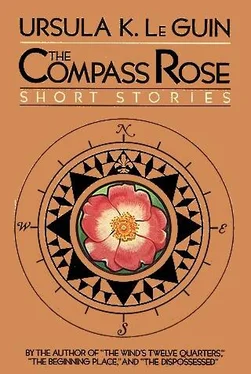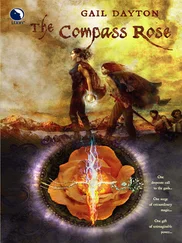Where did they come from, those dim, slow, vast tides? What pressure or attraction stirred the deeps to these slow drifting movements? We could not understand that; we could only feel their touch against us, but in straining our sense to guess their origin or end, we became aware of something else: something out there in the darkness of the great currents: sounds. We listened. We heard.
So our sense of space sharpened and localised to a sense of place. For sound is local, as sight is not. Sound is delimited by silence; and it does not rise out of the silence unless it is fairly close, both in space and in time. Though we stand where once the singer stood we cannot hear the voice singing; the years have carried it off on their tides, submerged it. Sound is a fragile thing, a tremor, as delicate as life itself. We may see the stars, but we cannot hear them. Even were the hollowness of outer space an atmosphere, an ether that transmitted the waves of sound, we could not hear the stars; they are too far away. At most if we listened we might hear our own sun, all the mighty roiling, exploding storm of its burning, as a whisper at the edge of hearing.
A sea wave laps one’s feet: it is the shock wave of a volcanic eruption on the far side of the world. But one hears nothing.'
A red light flickers on the horizon: it is the reflection in smoke of a city on the distant mainland, burning. But one hears nothing.
Only on the slopes of the volcano, in the suburbs of the city, does one begin to hear the deep thunder, and the high voices crying.
Thus, when we became aware that we were hearing, we were sure that the sounds we heard were fairly close to us. And yet we may have been quite wrong. For we were in a strange place, a deep place. Sound travels fast and far in the deep places, and the silence there is perfect, letting the least noise be heard for hundreds of miles.
And these were not small noises. The lights were tiny, but the sounds were vast: not loud, but very large. Often they were below the range of hearing, long slow vibrations rather than sounds. The first we heard seemed to us to rise up through the currents from beneath us: immense groans, sighs felt along the bone, a rumbling, a deep uneasy whispering.
Later, certain sounds came down to us from above, or borne along the endless levels of the darkness, and these were stranger yet, for they were music. A huge, calling, yearning music from far away in the darkness, calling not to us. Where are you? I am here.
Not to us.
They were the voices of the great souls, the great lives, the lonely ones, the voyagers. Calling. Not often answered. Where are you? Where have you gone?
But the bones, the keels and girders of white bones on icy isles of the South, the shores of bones did not reply.
Nor could we reply. But we listened, and the tears rose in our eyes, salt, not so salt as the oceans, the world-girdling deep bereaved currents, the abandoned roadways of the great lives; not so salt, but warmer.
I am here. Where have you gone?
No answer.
Only the whispering thunder from below.
But we knew now, though we could not answer, we knew because we heard, because we felt, because we wept, we knew that we were; and we remembered other voices.
Max came the next night. I sat on the toilet lid to practise, with the bathroom door shut. The FBI men on the other end of the bug got a solid half hour of scales and double stops, and then a quite good performance of the Hindemith unaccompanied viola sonata. The bathroom being very small and all hard surfaces, the noise I made was really tremendous. Not a good sound, far too much echo, but the sheer volume was contagious, and I played louder as I went on. The man up above knocked on the floor once; but if I have to listen to the weekly All-American Olympic Games at full blast every Sunday morning from his TV set, then he has to accept Paul Hindemith coming up out of his toilet now and then.
When I got tired I put a big wad of cotton over the bug, and came out of the bathroom half deaf. Simon and Max were on fire. Burning, unconsumed. Simon was scribbling formulae in traction, and Max was pumping his elbows up and down the way he does, like a boxer, and saying, “The e-lec-tron emission…” through his nose, with his eyes narrowed, and his mind evidently going light-years per second faster than his tongue, because he kept beginning over and saying, “The e-lec-tron emis-sion…” and pumping his elbows.
Intellectuals at work are very strange to look at. As strange as artists. I never could understand how an audience can sit there and look at a fiddler rolling his eyes and biting his tongue, or a horn player collecting spit, or a pianist like a black cat strapped to an electrified bench, as if what they saw had anything to do with the music.
I damped the fires with a quart of black-market beer—the legal kind is better, but I never have enough ration stamps for beer, I’m not thirsty enough to go without eating—and gradually Max and Simon cooled down. Max would have stayed talking all night, but I drove him out, because Simon was looking tired.
I put a new battery in the radio and left it playing in the bathroom, and blew out the candle and lay and talked with Simon; he was too excited to sleep. He said that Max had solved the problems that were bothering them before Simon was sent to Camp, and had fitted Simon’s equations to (as Simon put it) the bare facts: which means they have achieved “direct energy conversion.” Ten or twelve people have worked on it at different times since Simon published the theoretical part of it when he was twenty-two. The physicist Ann Jones had pointed out right away that the simplest practical application of the theory would be to build a “sun-tap,” a device for collecting and storing solar energy, only much cheaper and better than the U.S.G. Sola-Heetas that some rich people have on their houses. And it would have been simple only they kept hitting the same snag. Now Max has got around the snag.
I said that Simon published the theory, but that is inaccurate. Of course he’s never been able to publish any of his papers, in print; he’s not a Federal employee and doesn’t have a Government clearance. But it did get circulated in what the scientists and poets call Sammy’s-dot, that is, just handwritten or hectographed. It’s an old joke that the FBI arrests everybody with purple fingers, because they have either been hectographing Sammy’s-dots, or they have impetigo.
Anyhow, Simon was on top of the mountain that night. His true joy is in the pure math; but he had been working with Gara and Max and the others in this effort' to materialise the theory for ten years, and a taste of material victory is a good thing, once in a lifetime.
I asked him to explain what the sun tap would mean to the masses, with me as a representative mass. He explained that it means we can tap solar energy for power, using a device that’s easier to build than a jar battery. The efficiency and storage capacity are such that about ten minutes of sunlight will power an apartment complex like ours, heat and lights and elevators and all, for twenty-four hours; and no pollution, particulate or thermal or radioactive. “There isn’t any danger of using up the sun?” I asked. He took it soberly—it was a stupid question, but after all not so long ago people thought there wasn’t any danger of using up the earth—and said no, because we wouldn’t be pulling out energy, as we did when we mined and forested and split atoms, but just using the energy that comes to us anyhow: as the plants, the trees and grass and rosebushes, always have done.“You could call it Flower Power,” he said. He was high, high up on the mountain, ski jumping in the sunlight.
“The State owns us,” he said, “because the corporative State has a monopoly on power sources, and there’s not enough power to go round. But now, anybody could build a generator on their roof that would furnish enough power to light a city.”
Читать дальше




